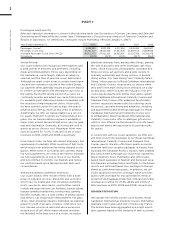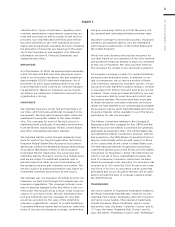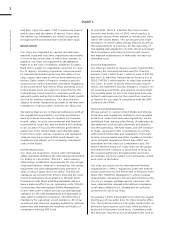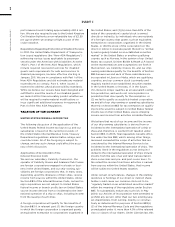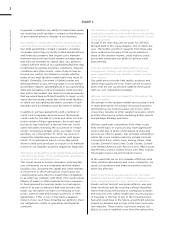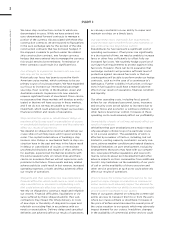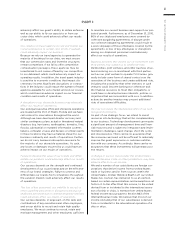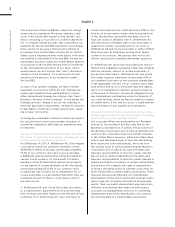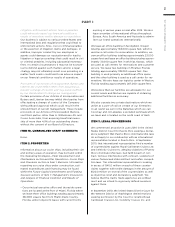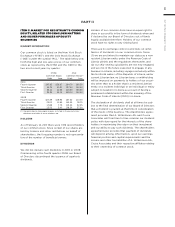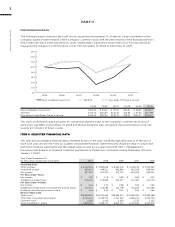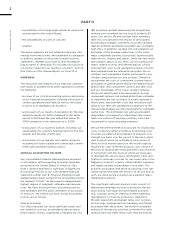Royal Caribbean Cruise Lines 2010 Annual Report Download - page 32
Download and view the complete annual report
Please find page 32 of the 2010 Royal Caribbean Cruise Lines annual report below. You can navigate through the pages in the report by either clicking on the pages listed below, or by using the keyword search tool below to find specific information within the annual report.
PART I
ROYAL CARIBBEAN CRUISES LTD. 29
world at competitive costs and, therefore, increase
our shipboard employee costs.
Incidents or adverse publicity concerning the cruise
vacation industry, unusual weather conditions and
other natural disasters or disruptions could affect
our reputation and harm our future sales and results
of operations.
The operation of cruise ships involves the risk of acci-
dents, illnesses and other incidents which may bring
into question guest safety, health, security and vaca-
tion satisfaction and create a perception that cruising
is more dangerous than other vacation alternatives.
Incidents involving cruise ships, and, in particular our
cruise ships, adverse media publicity concerning the
cruise vacation industry or unusual weather patterns
or natural disasters or disruptions, such as hurricanes
and earthquakes, could impact demand for our cruises.
In addition, any events which impact the travel indus-
try more generally may negatively impact our ability
to deliver guests to our cruises and/or interrupt our
ability to obtain services and goods from key vendors
in our supply chain. Any of the foregoing could have
an adverse impact on our results of operations and on
future industry performance.
Environmental, labor, health and safety, financial
responsibility and other maritime regulations could
affect operations and increase operating costs.
The United States and various state and foreign gov-
ernment or regulatory agencies have enacted or are
considering new environmental regulations or policies,
such as requiring the use of low sulfur fuels, increas-
ing fuel efficiency requirements or further restricting
emissions that could increase our cost for fuel and
adversely impact the cruise vacation industry. See
“Item 1. Business—Regulation—Environmental Regula-
tions.” An increase in fuel prices not only impacts our
fuel costs, but also some of our other expenses, such
as crew travel, freight and commodity prices. In addi-
tion, initiatives to limit greenhouse gas emissions have
been introduced or are being considered in several
European countries, and, beginning in January 2011,
the U.S. Environmental Protection Agency began reg-
ulating the carbon emissions of companies operating
in the United States. Although not all initiatives are
likely to be implemented, it is apparent that future
legislation and regulations related to climate change
could impact the cruise industry and adversely impact
our costs. Some environmental groups have also lob-
bied for more stringent regulation of cruise ships and
have generated negative publicity about the cruise
vacation industry and its environmental impact.
With regards to labor, we anticipate that the new
standards set forth in the Maritime Labour Convention
when ratified and effective (which we currently believe
may occur in 2011 and 2012, respectively) will likely
result in increased costs associated with our onboard
employees. See “Item 1. Business—Regulation—Labor
Regulations.” While we have been actively seeking
ways to mitigate the potential impact on our business,
there can be no assurances that our efforts will be
successful or that our financial results of operations
will not be materially impacted.
In addition, we are subject to various international,
national, state and local laws, regulations and treaties
that govern, among other things, safety standards
applicable to our ships, treatment of disabled per-
sons, health and sanitary standards applicable to our
guests, security standards on board our ships and at
the ship/port interface areas, and financial responsi-
bilities to our guests. These issues are, and we believe
will continue to be, an area of focus by the relevant
authorities throughout the world. This could result in
the enactment of more stringent regulation of cruise
ships that would subject us to increasing compliance
costs in the future.
Conducting business internationally may result in
increased costs and other risks.
We operate our business internationally and plan
to continue to develop our international presence.
Operating internationally exposes us to a number of
risks, including unstable local economic conditions.
Certain countries have been more severely impacted
by the recent economic downturn than other econo-
mies around the world where we do business including,
for example, Spain where we operate our Pullmantur
brand. Other risks attendant to operating internation-
ally include volatile local political conditions, potential
increases in duties and taxes, changes in laws and
policies affecting cruising, vacation or maritime busi-
nesses or governing the operations of foreign-based
companies, currency fluctuations, interest rate move-
ments, imposition of trade barriers and restrictions on
repatriation of earnings. If we are unable to address
these risks adequately, our financial position and
results of operations could be adversely affected,
including the impairment of the value of our ships,
goodwill and other assets.
Operating internationally exposes us to numerous and
sometimes conflicting legal and regulatory require-
ments. In many parts of the world, including countries
in which we operate, practices in the local business
communities might not conform to international busi-
ness standards. We may not be successful in ensuring
that our employees and other representatives sta-
tioned throughout the world properly adhere to our
policies or applicable laws or regulations. Failure to
adhere to our policies or applicable laws or regulations
could result in penalties, sanctions, damage to our
reputation and related costs which in turn could nega-
tively affect our results of operations and cash flow.



